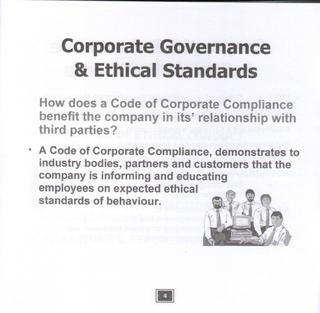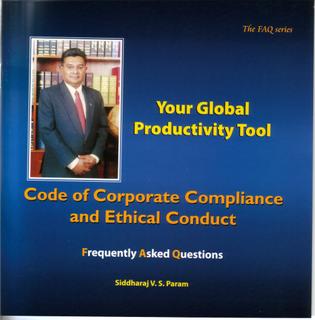THE CODE OF CORPORATE ETHICAL CONDUCT
A Global Productivity Tool!An effective Code of Corporate Ethical Conduct (Code of Conduct) seeks to shape corporate culture and organisational behaviour through the setting of clear guidelines on right and wrong action for the directors, managers and staff in a company thereby improving work attitude. The challenge is to prevent corporate wrongs from destroying companies.
A point to ponder on is the fact that corporate scandals from the East India Company to Barings, Enron and beyond have essentially been about failures of human conduct and hence ethics. So, a critical component of management in a global economy must be internal regulation within the corporation utilising a Code of Conduct. The board of directors is the first line of regulation for a company and the Code of Conduct is an instrument for regulation.
A Code of Conduct can be an effective instrument for productivity and the promotion of consumer confidence. It is people motivated with passion for productivity that generates profits and creates a prosperous company and community.
Topics that are covered in an effective Code of Conduct include:
Corporate Governance
Directors, managers, officers, agents and staff of the Company must always act in the best interest of the Company.
Standards of Ethical ConductIntegrity must be the underlying factor in all internal and external transactions and relationships.
Corporate Communications and Records RetentionAn employee shall assume that all communication to, with, for and on behalf of the Company are the property of the Company.
Liabilities in Sales Transactions
All representations made to outside parties by employees in reference to products must be in compliance with the company’s information on the product.
Duty of Care
To avoid negligence all duties must be carried out with care in accordance with acceptable standards under the law.
Violations and Reporting ProcedureThere must be a procedure for employees to report known or suspected work-related events of a questionable, fraudulent, or dishonest nature. The company cannot retaliate against any employee who reports such an event and must keep such reports confidential.
A Code of Conduct helps the company to manage legal compliance and achieve the desired work culture across the company.
The five critical elements for an effective Code of Conduct are:1. It must reflect legally sound advice.
2. There must be monitoring of acceptance by staff.
3. There must be a procedure of reporting to the board of directors.
4. It must be in plain business English with appropriate language translations.
5. It must be implemented throughout the company.
To be truly effective, it is extremely important that the Code of Conduct be written in a way that allows all staff to understand what is required from them. It should be in a style that projects a world class corporate culture.
Such a Code of Conduct when reflected in the annual report can have a positive impact on share value.
Siddha Param
Corporate Consultant
E-mail: siddhanet@yahoo.co.ukAuthor:
The Code of Corporate Compliance and Ethical Conduct – Frequently
Asked
Questions
Published by CMI Consulting Sdn. Bhd.
First Edition 2005
ISBN 983-42564-0-X

